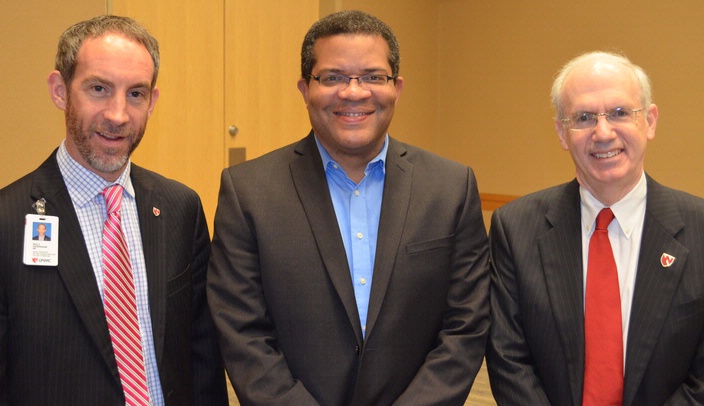On Jan. 25, the Office of Health Professions Education (OHPE) at Nebraska Medicine held a Health Equity Symposium to bring colleagues from UNMC and Nebraska Medicine together to take a deeper look at how the medical center is currently providing equitable care to patients and explore avenues for improvement.
Symposium attendees react
Lisa Runco, executive director of Digestive Diseases & Kidney (DDK):
“The DDK team members in attendance at the Health Equity Symposium left energized and thinking a lot more about the types of things we could do to impact our communities more purposefully.
“Of note, two of the most significant areas that affect Nebraska’s “score” as a healthy state are related to diabetes and obesity, which both reside in DDK’s program. As next steps, the DDK leaders plan to take an inventory of what our team members are currently doing in the community, and to include a conversation about the ideals they would like to achieve, particularly in the areas of diabetes and comprehensive weight loss. We also will discuss/research other places that we know have implemented programs or processes to successfully impact physical and social environments in their communities/regions, to see if there are ideas we could adapt to our resources.
“As we move further along in this journey and identify specific projects, we will continue to work with OHPE and would welcome participation by other departments who could contribute in meaningful ways.”
Michelle Grady, physician outreach liason:
“After attending the Health Equity Symposium, the business development team met to discuss possible projects that would help to close the health equity gap in Omaha as well as in the state of Nebraska. Business development’s goal is a long-term project, mapping life expectancy by ZIP code for the city of Omaha (with an ultimate goal of mapping the entire state). The team plans on meeting monthly to accomplish their goal.”
The event was the first step in a large institutional strategy, built around health equity, to find opportunities in the areas of measurement/evaluation, curriculum, systems/operations and community, to remove silos, reduce redundancy and leverage resources to increase efficiency in the med center’s outreach to the communities it serves.
Feedback to the event and the topic of health equity was overwhelmingly positive. Speaker Anthony Iton, M.D., J.D., helped explain how the social determinants of health that affect patients outside of the hospital are intertwined with the symptoms with which patients present.
Responses from event evaluation surveys show that on average, 95 percent of attendees felt that the three learning objectives met their expectations. The objectives were:
- develop a shared mental model of health equity for Nebraska Medicine;
- identify opportunities to ensure that equitable care is provided to patients at Nebraska Medicine; and
- reflect upon the role that individuals and teams play in the delivery of equitable care to patients and populations.
In addition, 92 percent of attendees intend to make changes, including having more discussion with colleagues, departments and leaders about health equity. Comments show that attendees intend to collaborate across departments and colleges to incorporate cultural competence, health literacy and other related training as part of patient care.
The day after the symposium, many colleagues contacted OHPE expressing a desire to become champions in this work. And many departments are interested in taking a deeper look at opportunities to improve patient health through our community.
Moving forward, the OHPE will host a planning session for the community, curriculum and systems workgroups to review data and responses from the symposium and continue planning. The measurement/evaluation group is invited to join any of the three groups to share their expertise in those areas.
The date for these workgroups will be in the Nebraska Medicine Now and UNMC Today in the upcoming weeks.
Collagues interested in being part of any of these groups, sharing work that is currently under way, or learning more about health equity, please contact OHPE or call 402-559-9700.
